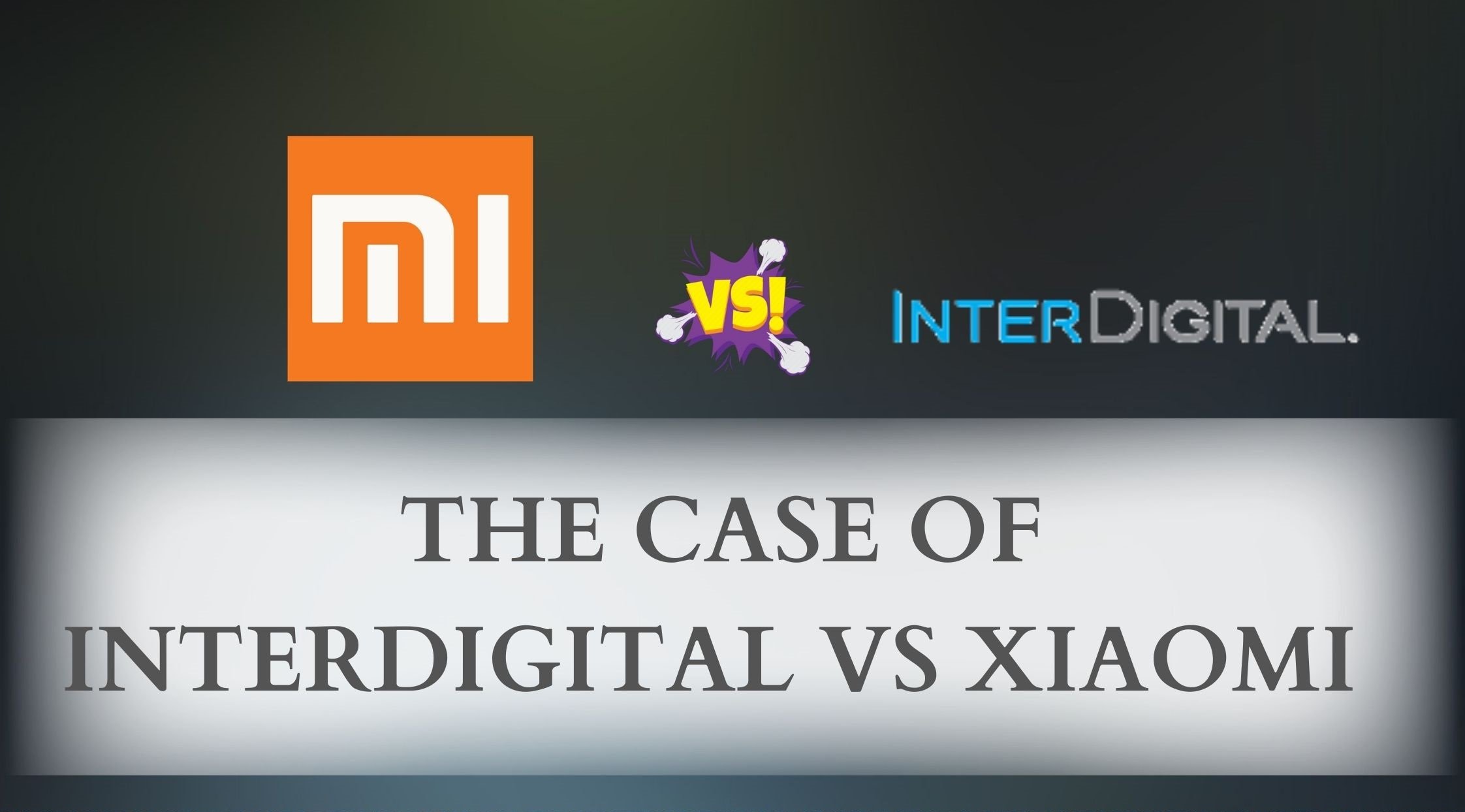THE CASE OF INTERDIGITAL TECHNOLOGY VS XIAOMI CORPORATION
Interdigital, filed a complaint against Xiaomi claiming violation of a patent by using SEPs without obtaining an Interdigital licence. Interdigital claims to have recourse to Xiaomi utilizing a permanent injunction or by securing a licence to use SEPs owned by Interdigital.

FACTS:
The plaintiff, Interdigital, filed a complaint against Xiaomi claiming violation of a patent by using SEPs without obtaining an Interdigital licence. Interdigital claims to have recourse to Xiaomi utilizing a permanent injunction or by securing a licence to use SEPs owned by Interdigital.
Interdigital licenced its SEPs to third parties and called on Xiaomi to receive such a licence as well. The rate proposed by Xiaomi for not confirming FRAND (fair, rational and non-discriminatory) criteria were rejected by Interdigital. Xiaomi, the defendant wants information that can be accessed from comparable licence agreements as to the identity of the third-party licensee, the exact region and nature of the licence given to that licensee, etc. To determine the royalty rate in terms of being FRAND, the defendant is needed. Only technical experts, ex-house advocates and lawyers of Xiaomi and not staff, officers of Xiaomi will be able to access the records, reserved for Legal Eyes Only (LEO), falling under the inner tier. This suggests that Xiaomi's advocates and technological experts will negotiate the sum of the royalty rate based on third-party licencing agreements without taking any feedback from its staff, taking into account that such rates confirm the FRAND requirements and are suitably beneficial to their customers.
ISSUES:
If the agreement of the two-tier confidentiality club is valid
ARGUMENTS BY PLAINTIFF:
Plaintiff had claimed that, when dealing with SEP infringement litigation, such an agreement is acknowledged and remembered by courts worldwide. Also, the Plaintiff had claimed that such an arrangement would be mutual and would favour Defendant as well. Plaintiff also argued that, in cases such as this, it was the agreed legal position that it was not appropriate for the parties or their workers to reveal all the details.
Plaintiff had averred that such agreements had been formed in the past and worked in response to the Court's question as to how a lawyer might be presumed to be adequately advised if he is unable to communicate with his clients the information on which the opposing party wishes to rely.
Furthermore, in answer to the Court's second query as to how the court could come between the lawyer and his client, as far as the 'inner tier' documents were concerned and the lawyer was ordered to reveal the documents to his client, the Plaintiff had averted that there would be no possibility for the Court to come between the client and the lawyer as though the Court were to accede to the prayer
ARGUMENTS BY DEFENDANT:
The defendant argued that no one should be able to rely on documents that the other party had no access to. Also, granting access to supporters and experts does not constitute an alternative to granting the parties themselves access. Also, the defendant relied on the sacred principle that an attorney acts solely on his client's orders.
REASONING:
The agreement of the confidentiality club does not comply with Annex F of the Original Side Rules, which provides that all parties should consent unanimously to uphold the confidentiality of their documents supporting their case. Another way to achieve a reasonable balance of interests would be to allow access to such records only by professional experts, retired lawyers and lawyers of both parties and not by both parties or their employees.
The judiciary stressed the principles and relevant laws enshrined in the Advocates Act, 1961. The customer-counsel relationship is constitutionally held to be sacred and inviolable. This confidential club agreement is in breach of the laws of the Bar Council.
Reliance on the Himalayan Coop Case. Group Society for Lodging. Consequently, counsel should not hold unrevealed data from his or her client. Eliminating the client from accessing the internal tier documents, but allowing the client's lawyer and solicitor to access the same documents may not be in compliance with the law that directs a lawyer when performing duty towards the client, irrespective of the personal opinion of the lawyer on the case, must act by following only her/his client's orders. Undoubtedly, if access to some document is denied to the client, the purpose of the client-counsel connection will not be fulfilled.
After using the comparable licencing agreement, Xiaomi has to make an informed decision, otherwise, it amounts to a rejection of equal chance. Fixing FRAND rates is a very important aspect of Xiaomi's market. The court, therefore, claimed that no one should rely on documents to which the other party has no access and that granting access to advocates and experts is not a replacement for granting access to documents to which the other party itself has no access.
The involvement of Xiaomi employees is important because the company would suffer irreparable losses if FRAND prices are not properly set.
Interdigital would benefit from its most trusted in-house counsel, while Xiaomi in this arrangement will have to rely on strange ex-house counsel. It would be gross unfairness. Furthermore, since it is a breach of natural justice, Interdigital cannot be permitted to redact the sensitive data section of third-party licencing agreements.
JUDGEMENT:
It is unacceptable to suggest giving access only to its supporters and experts while refusing Xiaomi access to them. The two-tier confidentiality club should only be formed after the consent of all parties to the dispute is granted. The court established that agreement between the parties to the dispute, if any, shall take precedence over the judgement. A single-tier club with conditions prescribed should be formed rather than a two-tier confidential club. To impart justice, the business interests of all parties to the conflict bear equal value.
TO KNOW MORE ABOUT PATENTS, WATCH THIS -
BY - ADITI GOEL












